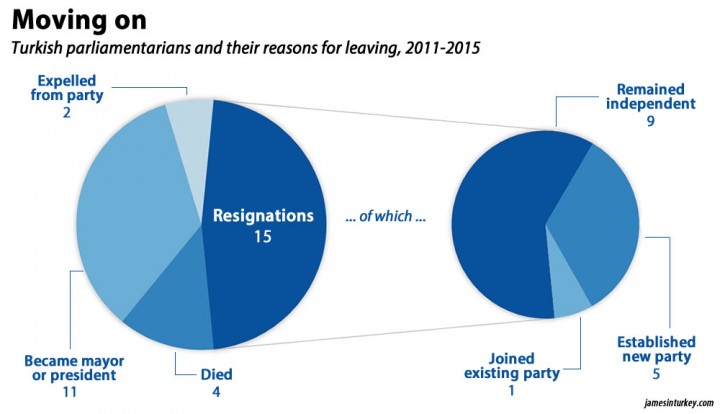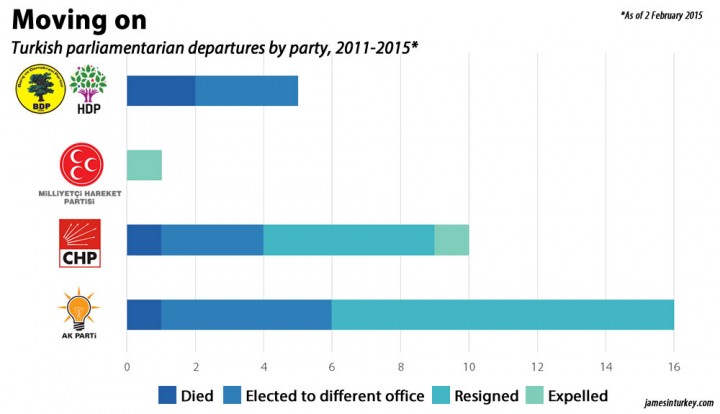More members of parliament have left the AK Party than any other in this session, but opposition lines haven’t exactly held firm
 Turkey has no system for filling parliamentary vacancies when they occur. The law does allow for by-elections (“ara seçim“) but these are only triggered when a province is left with no seats at all or if more than five percent of the chamber (28 seats) is vacated.
Turkey has no system for filling parliamentary vacancies when they occur. The law does allow for by-elections (“ara seçim“) but these are only triggered when a province is left with no seats at all or if more than five percent of the chamber (28 seats) is vacated.
These conditions mean by-elections in Turkey are extremely rare. It also means the country’s 550-seat parliament builds up a large number of vacancies as its term draws to close.
15 seats are empty in today’s chamber: four members passed away since the last election in 2011, while eleven were elected either president or a mayor last year. It’s far from the 28 seats needed to trigger a by-election – and even if it were close, the rules dictate that an ara seçim cannot take place with less than a year to go until a general election.
But among those MPs who retain their seats, not all have retained their party. Seventeen members of parliament have changed colours since 2011: the vast majority (15) were individual resignations, while two MPs have been expelled.
FIRST EXPELLED, THEN ELECTED
İhsan Barutçu was the first MP to be ejected from his party and it happened before he was even elected. He refused to resign after footage of him allegedly with a prostitute appeared on the internet mere days before the 2011 election.
The Nationalist Movement Party (MHP) tried to deselect him but the Electoral Council ruled their candidate list was unalterable. He was duly elected and remained an independent MP ever since.

The other MP to be kicked out this term was Süheyl Batum. His Republican People’s Party (CHP) expelled him in December last year for comments his made in support of Emine Ülker Tarhan, who had resigned from the party the previous month.
RESIGNATIONS APLENTY
Resignation has been the most popular route of departure in this parliament. At the turn of the century made would do this to switch parties, but only one MP has done so since 2011. The distinction belongs to Salih Fırat, CHP MP for Adıyaman, who switched to the governing AK Party in March 2013.
More fashionable has been to resign and launch a new party of your own. Five MPs have done this so far, ranging from İdris Bal, who left AK to start the Democratic Progress Party, to Emrehan Halıcı, who cast the CHP aside for the delightfully-named Electronic Democracy Party.
 The majority of resigning MPs have opted to remain independent members. Most of those who left AK in the wake of December 2013’s cabinet corruption scandal, for example, have not since affiliated themselves to any party.
The majority of resigning MPs have opted to remain independent members. Most of those who left AK in the wake of December 2013’s cabinet corruption scandal, for example, have not since affiliated themselves to any party.
SMALL PARTIES SHED FEWER
The AK Party has seen sixteen of its 327 MPs move on for a variety of reasons, more than any other. But the CHP lost ten members out of 135, a larger portion of its own parliamentary party.
The smaller parties have been more robust: the MHP has not shed a single member aside from its sole pre-election expulsion, while among the 35 Kurdish-backed independents, two passed away and three moved onto mayoral office. They may have a thing or two to teach about party loyalty.









